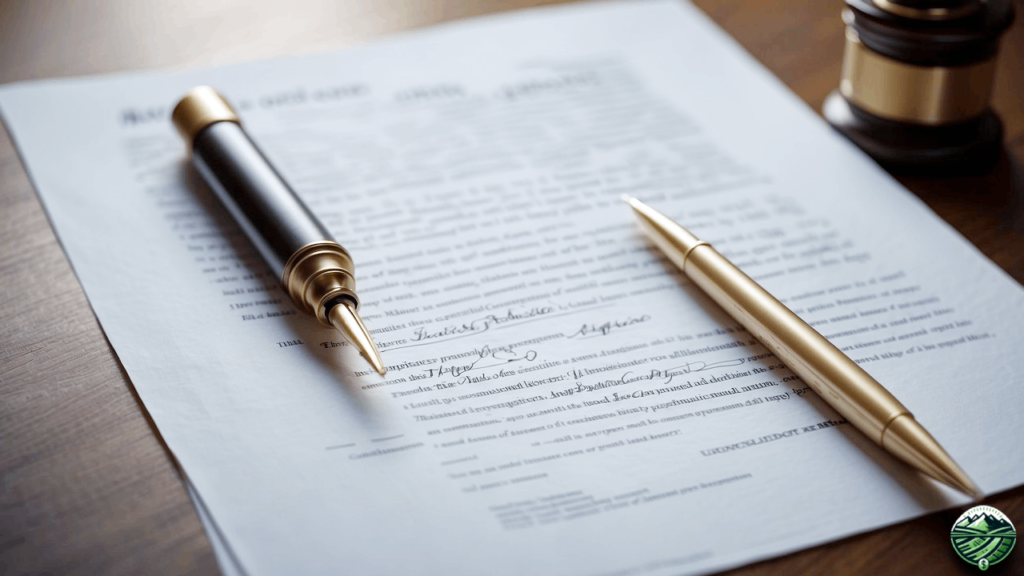What is a deed? It’s an important question. I always find it thrilling to break down complex real estate concepts into simple, digestible pieces of information, and I’ll attempt to do that for you here.
Today, I’m particularly excited to talk about deeds, which are fundamental in the world of property ownership and a crucial part of land investing.
Understanding the ins and outs of a deed is crucial for anyone involved in the buying or selling of land, including investors like us at LandVerse who are constantly on the lookout for the next great deal.
The difference between holding a deed and not can be compared to having a key; it’s the key that unlocks ownership and the potential that comes with it.
Why Understanding A Deed Is Crucial For Land Flipping

In my experience, knowledge of deeds is essential when you’re flipping land.
A deed is a legal document that proves ownership of property.
I’m always careful to understand the deed completely because it outlines my rights as an owner — which is invaluable when transforming properties for profit.
- Accuracy: Confirming that the description on the deed matches the land I’m interested in is the first step. An accurate deed secures my investment.
- Title Transfer: To flip land effectively, I must ensure the deed allows me to transfer the title. Without this ability, my flipping process halts.
- Protection: A clear deed protects me from potential legal disputes, which is key for a smooth flip.
Moreover, different types of deeds offer varying levels of protection. I always prefer to work with warranty deeds where possible because they offer the most assurance against claims and liens.
Understanding Deed Types
In the thrilling world of land ownership, deeds play a pivotal role in the transfer and affirmation of property rights.
They are the cornerstone of my transactions, allowing me to legally claim ownership of a parcel.
There are several types of deeds I might encounter, each with different levels of warranty:
- General Warranty Deed
- Offers the highest level of protection
- Guarantees the property is free from all liens and claims
- Special Warranty Deed
- Provides a moderate level of protection
- The grantor only ensures the property is clear of defects during their ownership
- Quitclaim Deed
- Offers no warranties
- The grantor transfers whatever interest they possess in the property
I always hope to secure a General Warranty Deed, or at the very least, a Special Warranty Deed.
Personally, I do not do deals where I can only get a quitclaim deed for a variety of reasons.
Generally, these tend to be smaller deals, such as desert square lots. We go after deals that are bigger and have lots of potential profit.
Secondly, I do not want to risk not having complete ownership of a property. This does happen – you think you are purchasing a property outright, but it turns out a long-lost family member also has ownership in the property.
Then, when you go to tell the property (and if the buyer wants title insurance), you find out that you only own divided interest in a property – a fancy way of saying, you don’t own all of it.
Now, let’s jump into the technical nitty-gritty of a deed.
Components of a Deed
Every deed I work with has specific crucial components:
- Premises or Granting Clause: Establishes the intent to convey the property, who’s involved, and any warranties.
- Consideration: What I might exchange for the property, usually money.
- Grantor and Grantee: The names of the seller (grantor) and the buyer (grantee) – that’s me!
- Legal Description of Property: A detailed description of the property, which I double-check for accuracy.
- Signature of Grantor: It’s not valid until the seller signs on the dotted line.
- Acknowledgment: Often requires a notary public to authenticate.
Deed Parties

In my work with land flipping, understanding the roles of deed parties has been crucial.
The deed, an essential document for land transactions, involves specific participants — each playing a pivotal part in the property’s transfer of ownership.
Grantor and Grantee
Grantor – The person or entity transferring the property. I verify the grantor’s identity to ensure they have the legal capacity and right to convey the land.
Grantee – The recipient of the property. I always double-check that the grantee’s details are accurate and clearly spelled out on the deed.
I do this even when using a title company, which we will talk about more below.
Witnessing and Notarization
Witnessing – A key step where a neutral third party observes the signing of the deed. I find this bolsters the deed’s legitimacy and helps prevent future disputes.
Notarization – The deed is often not only witnessed but also notarized. A notary is a certified official who affirms that the signers are who they claim to be. A notarized deed is a shield, adding an extra layer of authenticity and trust to the transaction.
Property Transfer

When I arrange a deed for my property, I ensure the document serves as a legal tool to transfer ownership.
This section uncovers the vital facets of the property transfer process, emphasizing the step-by-step conveyance process and the critical role of recording deeds to establish validity.
Conveyance Process
Transferring property is an intricate dance, and I always follow the choreographed steps to a tee.
It starts with a deed, a legal instrument that I use to convey my property to another party. To break it down:
- Preparation: A deed must be prepared, usually by an attorney or legal professional, detailing the property and the terms.
- Signing: The deed requires my signature, verifying that I intend to transfer the property.
- Acknowledgment: Before it’s official, a public official, often a notary, confirms my identity and voluntary sign-off.
- Delivery: Simply signing isn’t enough—I hand over the deed to the grantee, finalizing the transfer.
Recording and Validity
The satisfaction of handing over a deed is immense, but I don’t stop there. Recording the deed into public record is pivotal for several reasons:
- Proof of Ownership: It’s my way of shouting from the rooftops that the property has a new owner.
- Priority: Recorded deeds let everyone know the sequence of transactions, which is vital in disputes.
- Protection against Claims: A recorded deed is a shield, safeguarding me from subsequent claims to the property.
Legal Considerations
In the intricate dance of land transactions, I see deeds as the pivotal partners.
They not only transfer ownership but also come embedded with critical legal stipulations that I need to navigate with precision. Let’s zero in on the essentials.
Encumbrances and Liens
Encumbrances are like invisible threads attached to property, which can include various liens or other limitations.
When I analyze a deed, I’m keenly aware that any existing encumbrances can affect my use and future potential profitability of the property.
For instance:
- Liens: A legal claim against a property, often due to unpaid debt.
- Mortgage Liens: These are granted to lenders until I pay off my mortgage.
- Tax Liens: Governments can place these if I owe taxes.
It’s crucial to ensure the property I’m flipping is free of such entanglements, or at least that I’m fully aware of them.
Covenants and Warranties

Covenants in a deed are promises embedded within the legal document that I look out for. They can outline what can or cannot be done with the property. This also includes things such as easements.
Warranties, on the other hand, offer assurances about the extent of the grantor’s interest in the property and the freedom from undisclosed encumbrances.
- General Warranty Deeds: These provide the highest level of buyer protection, assuring me that the property is free from all encumbrances, aside from those I’m openly made aware of.
- Special Warranty Deeds: These are more limited, only securing me against issues that arose during the grantor’s period of ownership.
As I make my mark in the world of land flipping with LandVerse, understanding these legal subtleties is not just beneficial—it’s exhilarating!
Probate and Foreclosure Aspects
Probate Factors
When I’m considering a property tied to an estate, digging into probate details is essential. Probate is the process of settling a deceased person’s estate and transferring the property to rightful heirs.
My focus is on verifying a clear transfer to avoid any potential claims against the property after my purchase.
Critical Probate Checkpoints:
- Ensure the estate has been properly probated
- Confirm transfer of title to the sellers
Foreclosure Factors
If I’m eyeing a property that has gone through foreclosure, I need to be doubly sure that the foreclosure process was carried out correctly.
Mistakes or issues during foreclosure can come back to haunt me, so a thorough vetting process is necessary to establish a clear title before moving forward.
Foreclosure Scrutiny:
- Cross-check the legal procedure’s adherence to state laws
- Investigate proper notices given to borrowers
Generally speaking, we do not go after probate or foreclosure deals, but many real estate investors do so I figured it was important to include this here.
Should You Use A Title Company When Flipping Land?

When I dive into flipping land, teaming up with a title company is like having a secret weapon.
They’re the experts who make sure my property titles are clean and clear of any issues.
No more sleepless nights worrying about legal snags!
- Title Search: The title company conducts an in-depth search to verify the land’s history. It’s thrilling to know every nook and cranny of my land’s past is being scrutinized for my peace of mind.
- Escrow Services: These guys are like the trusted middlemen who hold onto the funds. I love watching them work, ensuring that every penny is accounted for, and keeping my money safe until the deal is done.
- Title Insurance: This is where the title company really shines! They offer insurance to protect me from any unforeseen claims. Who wouldn’t be excited about having a safety net for their investments?
They essentially handle the hard part of this process, all the legalese, etc etc.
We always use a title company to conduct our deals.
Deed vs. Title: Understanding the Difference
When it comes to land ownership, the terms ‘deed’ and ‘title’ are often used interchangeably, but they represent distinctly different concepts.
Here’s what you need to know:
Deed: A deed is a physical legal document that transfers ownership of property from one party to another. It contains the names of the old and new owners and a detailed description of the property.
For a deed to be legally operative, it must be delivered and accepted, usually recorded with the local government to establish the change of ownership.
Title: In contrast, the title is not a document but a concept that signifies the legal right to own, use, and dispose of property. Holding a title means you have the ownership rights to the property.
Understanding the distinction between deed and title is pivotal in the realm of real estate.
It ensures that land flippers like those at LandVerse can navigate the complexities of property transactions with confidence and precision.
Conclusion
In conclusion, understanding deeds is crucial in the land flipping game, and now you can successfully understand the question “What is a deed?”.
Interested in learning how to make significant profits while flipping land?
With the LandVerse Masterclass, you’ll master the ins and outs of property ownership transfers, ensuring each flip is smooth and legally sound.
Unlock the full potential of land investing—know your deeds, boost your confidence, and elevate your profits. Dive into the Masterclass and transform your land flipping journey today.






